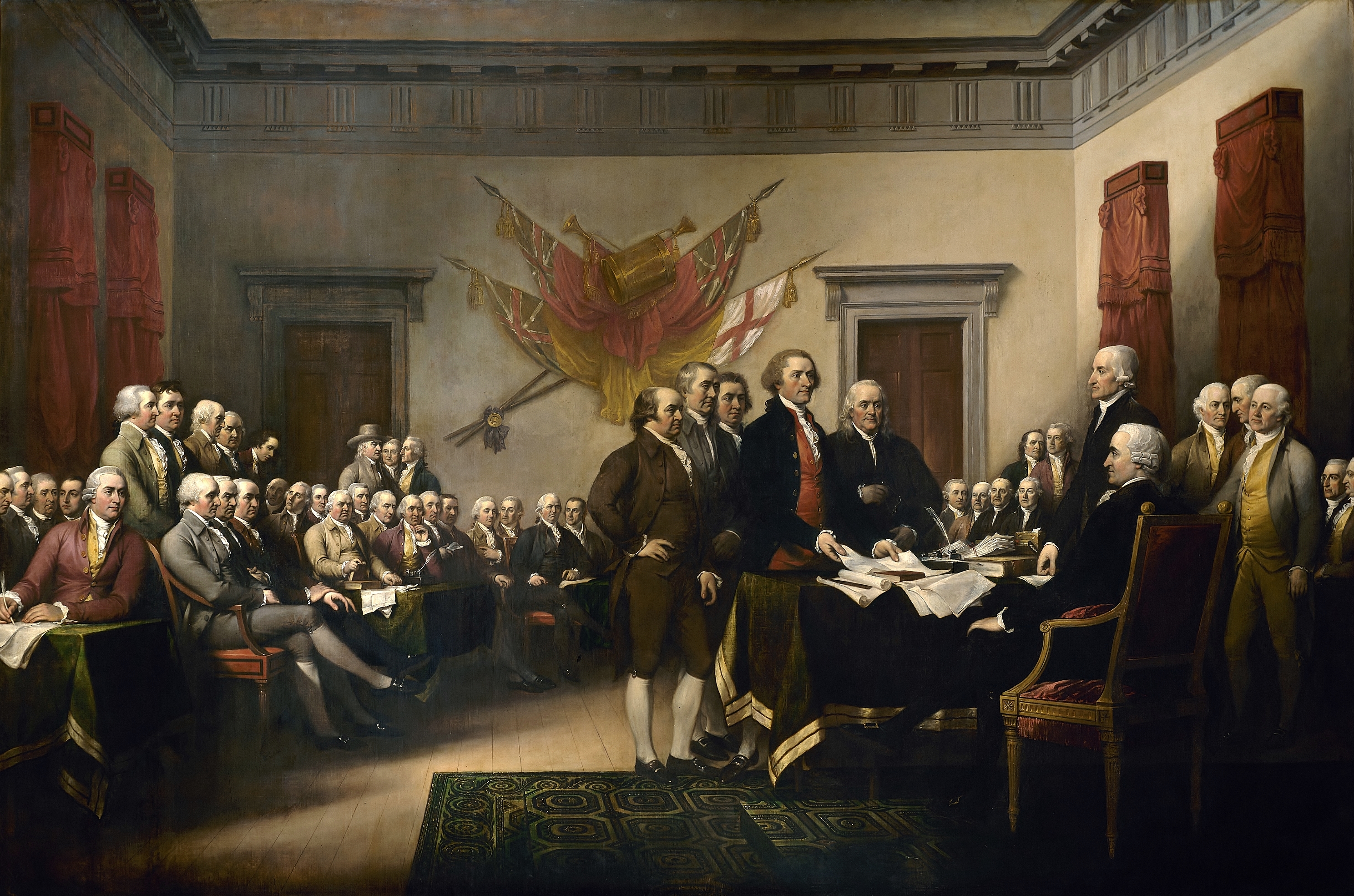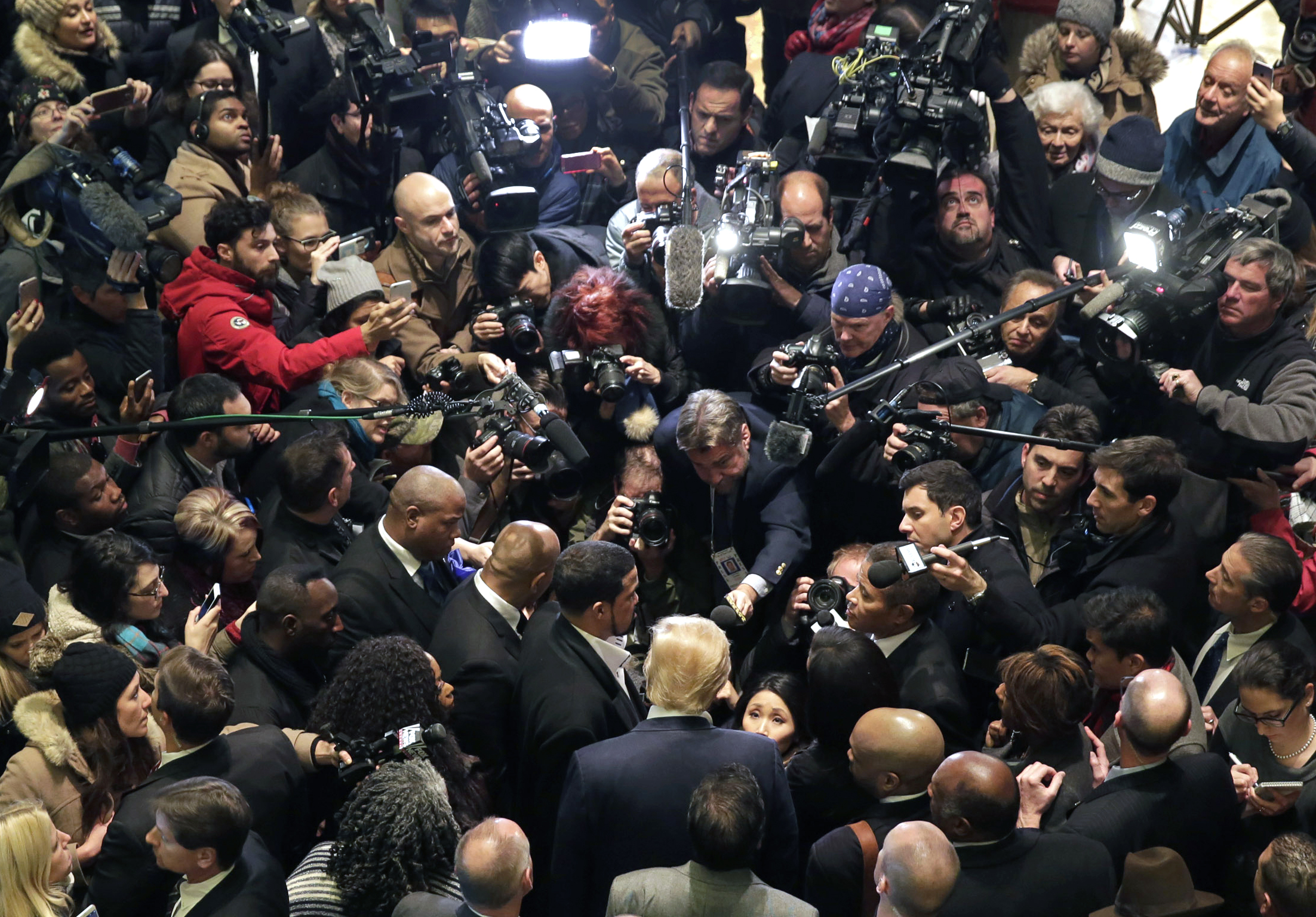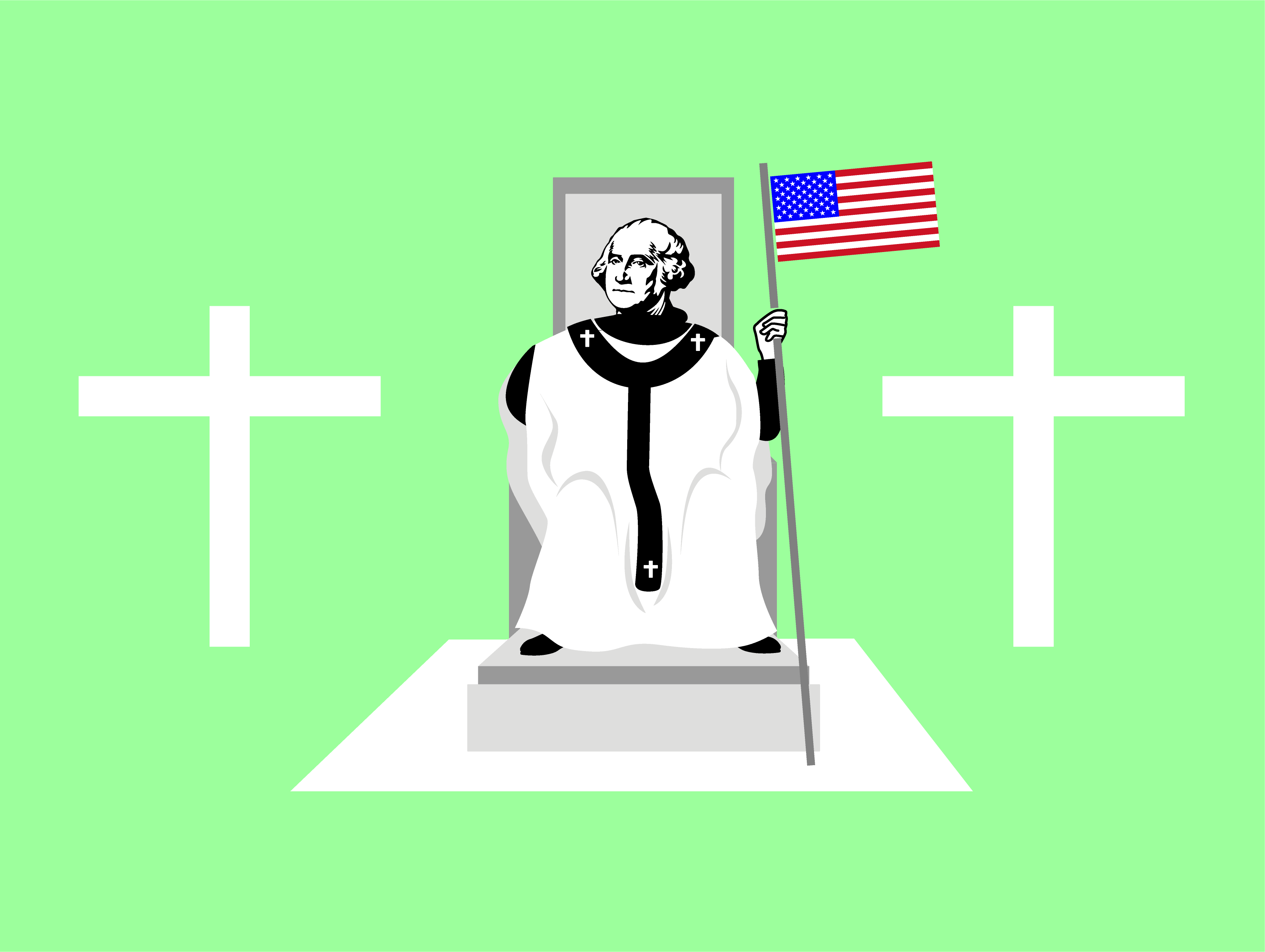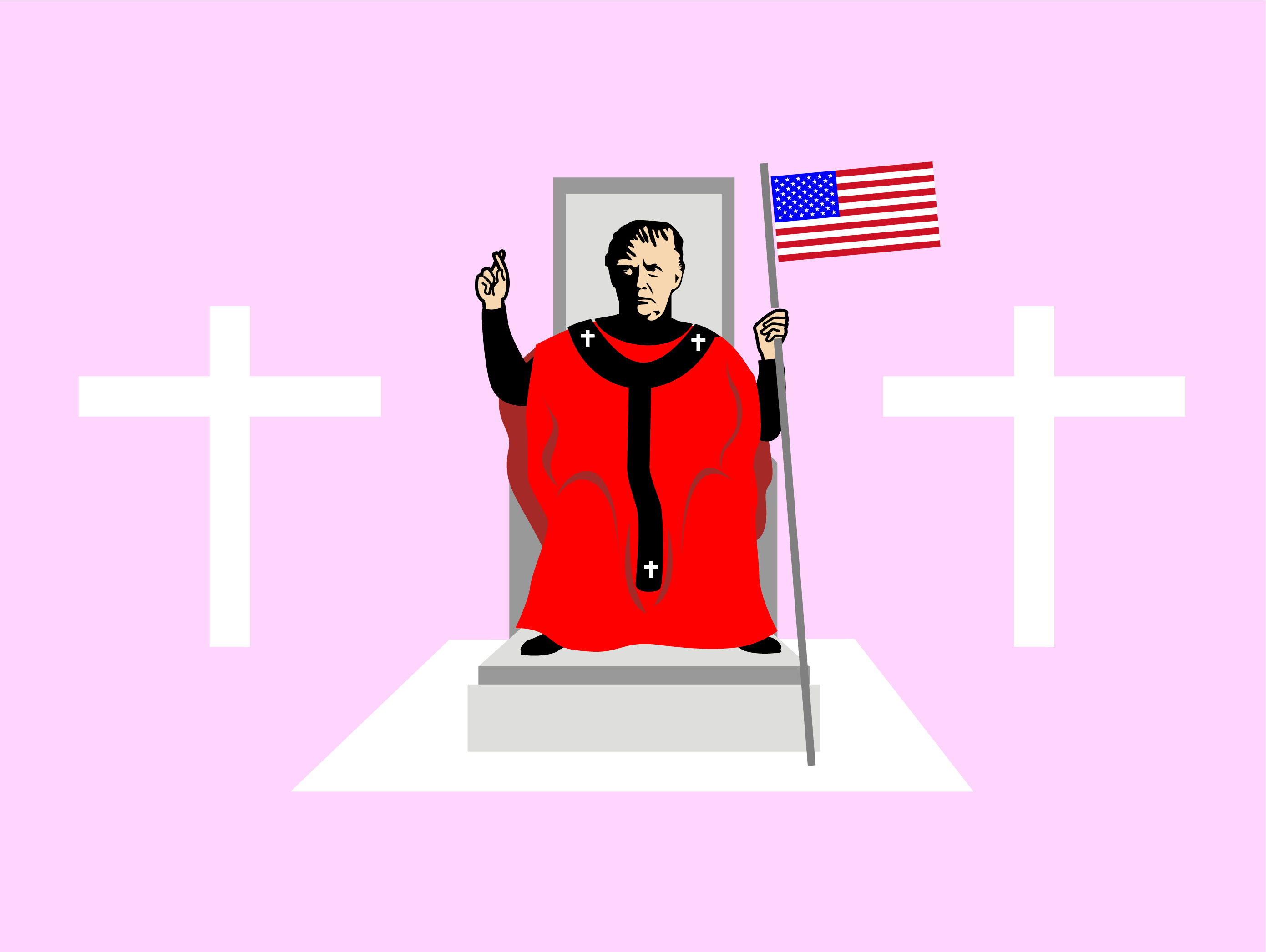This is the second in a series on Christian nationalism and the religious groups supporting Donald Trump. You can read the first one here, and the third more data-driven piece here.
When President Donald Trump defended white nationalists last week, it seemed like much of the country couldn’t condemn him fast enough. In addition to a wave of opprobrium from progressives, Republican lawmakers, conservative pundits, and CEOs all rushed to distance themselves from the scandal-prone president.
But as the condemnations pile up, one group has yet to abandon the commander-in-chief: his evangelical Christian advisers.
Instead of criticizing Trump’s remarks, many of these faith leaders have either remained silent or have simply offered general denunciations of racism. Others, such as Liberty University president Jerry Falwell Jr., have even gone so far as to defend the president. So far, in the aftermath of Trump’s response to the violence in Charlottesville, only one of Trump’s evangelical advisors has stepped down.
Finally a leader in WH. Jobs returning, N Korea backing down, bold truthful stmt about #charlottesville tragedy.So proud of @realdonaldtrump
— Jerry Falwell (@JerryFalwellJr) August 16, 2017
The deafening silence has confused and frustrated many observers, including evangelicals. Some speculate that corporations have replaced religion as the country’s moral compass, wondering aloud why faith leaders aren’t demanding the president walk back statements that were celebrated by white supremacists.
But when it comes to at least one subset of Trump’s religious devotees, this reticence makes sense—and not because all of them necessarily support the white supremacists who rallied in Virginia last week. Instead, it may be because they share a very specific worldview that shapes their relationship to the president: Christian nationalism.
Historians agree the roots of American Christian nationalism—including flavors that do insist on white supremacy—stretch back decades. Today’s right-wing preachers are hardly the first group to insist on a “Christian” America, or to heap praise on a “strongman” leader. Yet historians also agree that previous examples of Christian nationalism are distinct from the variety preached by today’s so-called “Trumpvangelicals.”
The result is an odd theological paradox. Pro-Trump Christian nationalism may be decidedly American in form, but it also has a frightening amount in common with historical examples of flag-waving spirituality in other countries—including those with far darker pasts.

Christian nationalism has always been a key part of American political discourse
Christian nationalism isn’t just common in America. It’s foundational.
At least that’s the argument Aeon editor and former Harvard Society fellow Sam Haselby makes in his book The Origins of American Religious Nationalism, in which he insists American Christian nationalism is an inescapable part our national political discourse. He points to some of the earliest revolutionaries as proof: A band of (apparently laughably bad) poets calling themselves Connecticut Wits were among the first to protest for American independence, calling for a society that was “hierarchical, theological, and anti-racist” in nature.
“[Christian nationalism is] an old debate, as old as the United States itself,” Haselby wrote in a recent Washington Post op-ed.
Granted, the Connecticut Wit social framework didn’t win out against its eventual rival, the so-called Jeffersonian or Virginia model of American identity, which Haselby describes as ultimately “evangelical, egalitarian, and racist.” But like the savior they worship, religious nationalism would not die. As the United States evolved, Haselby says two Protestant Christian ideological frameworks — which he calls “national evangelicalism” and “frontier revivalism” — began to vie for power. Their intellectual dimensions are complex, but the result of their feud was the creation of a shared political rhetoric Haselby describes as religious nationalism, primary articulated through the lens of Protestant Christianity.
The scholar differentiates his definition of Christian nationalism from more contemporary iterations by pointing to three defining (but broad) characteristics.
“Abraham Lincoln called on his fellow countrymen to revere American revolutionaries and the U.S. Constitution as part of the ‘political religion of the nation,'”
The first is the almost sacred status Americans often bestow upon the Founding Fathers and the nation’s founding documents. In 1838, for instance, a 28-year-old Abraham Lincoln called on his fellow countrymen to revere American revolutionaries and the U.S. Constitution as part of the “political religion of the nation,” which he argued should be “breathed by every American mother to the lisping babe…taught in schools, in seminaries, and in colleges…let it be preached from the pulpit, proclaimed in legislative halls.”
Haselby says this reverence for historical figures is unusual when compared to other industrialized states in Europe, where “founders” in the American sense are an alien concept.
“There is no counterpart in, say, Britain,” he said in an interview with ThinkProgress. “The figure that comes closest to that is probably Winston Churchill.”
The second feature of American religious nationalism, Haselby says, is the fact that leaders of U.S. social movements often invoke what he calls the “Jeremiad” narrative, or the idea that their political cause is in keeping with the spirit of America’s founding. The third facet is the most obvious: The undeniable prevalence of religious rhetoric or “God talk” in political spaces, no matter which party is in power.
“There’s a lot of liberals and progressive people who theologize,” he said. “When it comes to nationality, Americans are people of the word. They’re textual exegetes, whether they’re liberal or conservative.”
It’s easy to find evidence of these tendencies—sometimes described as our country’s “civil religion”—in modern American political disputes. Fervent debates over what is “constitutional” have defined Trump’s young presidency, with advocates on all sides invoking founding documents in ways that can resemble a theological discussion. Trump supporters and “resistance” activists alike insist their movement carried the torch of liberty lit by the Founders. And appeals to the Almighty were present at both the RNC and the DNC this year, with the latter arguably more overtly religious than the former.
But few groups indulge in this tradition more passionately than today’s Christian nationalists, whose repeated (and disputed) calls for America to be “restored” as a “Christian nation” mixes all three of Haselby’s elements. When leaders such as Franklin Graham say God has blessed America more than any other nation on earth, they often mean it in a very specific way: Namely, that America is somehow special to God, and has been since its founding, when it supposedly was “built on Christian principles.”
Their passion for founding documents is also obvious, albeit typically coupled with a very specific interpretation of the text itself.
“Our forefathers, when they gave us our Constitution, they never intended us to leave our faith right here on these steps when you go into the Capitol,” Graham said in 2016.

In the Trump era, Christian nationalism is different
Haselby’s assessment only points to the historical tools of Christian nationalism, not the unusual way that Christian nationalists have chosen to wield them. The difference matters: The most diagnostic features of modern Christian nationalism—adherents’ antipathy towards science, so-called “secular” institutions, and government overreach—would have confused their 18th- and 19th-century forbears.
“Their hostility to science and educational institutions is distinctive—America’s 18th-century Christians were obsessed with Isaac Newton,” Haselby said. “America’s early Christian nationalists were very pro-state. The libertarian anti-state of today’s Christian nationalists is the opposite of the original.”
He added: “The most acute Christian nationalists of today would want nothing to do with the politics of America’s [earliest] Christian nationalists.”
But the oddest thing about modern American Christian nationalism is its fascination with Trump himself. Throughout U.S. history, faith leaders have showered praise on presidents (including Barack Obama), but today’s Trump-loving Christian nationalists have pushed this tradition to its limits.
“The most acute Christian nationalists of today would want nothing to do with the politics of America’s [earliest] Christian nationalists.”
Evangelical leaders such as Lance Wallnau proclaim to their followers that Trump is anointed by God to lead the country. Robert Jeffress preached a sermon entitled “When God chooses a leader” to Trump himself on Inauguration Day; Jeffress has since made (highly disputed) scriptural arguments insisting God gives Trump the “authority” to kill foreign leaders, and even commissioned his own church choir to sing a hymn-like ballad based on the president campaign slogan “Make America Great Again.”
Taken in isolation, it’s possible to find examples in American history to justify most of these actions. But the intensity of pro-Trump faith rhetoric — combined with the broader mosaic of Christian nationalism — is unusual.
The end result has been enough to unsettle evangelical writer Ed Stetzer, a leading theological voice among Christian conservatives. Just this month, the Wheaton College professor published a pair of Christianity Today op-eds denouncing those who make faith-based excuses for Trump’s mistakes (he called it “21st century idolatry”), and warned against the dangers “both scripturally and historically” of honoring country over God.
Haselby, for his part, chalked up talk of Trump’s anointment to the influence of other American institutions.
“The novelist William Gass once said if America ever has a dictator, he’ll be a football coach. I think Trump makes as much sense in that authoritarian context as in one of Christian anointment,” Haselby said. He later added: “Especially in business and sports, two vibrant American undertakings, leaders are often seen as driving history … Anointment is mostly just a theological idiom for recognizing an idea of how history and the world move, behind individual leadership, that is more familiar in sports and business.”

Power-driven Christian nationalism is scary stuff
Although less common in U.S. history, there are ample examples of Trump-style Christian nationalism in other parts of the world.
The Russian Orthodox Church, for instance, currently enjoys disproportionate freedom compared to other religious groups in President Vladimir Putin’s Russia, and church leaders often act as advocates for the state’s agenda at home and abroad. Some American evangelicals—including several that express Christian nationalist views—have slowly formed an alliance with Russian church leaders in recent years, leading to a cross-pollination of rhetoric and tactics.
Other nations showcase a wide range of Christian nationalist expressions. In China, it’s arguably imposed upon believers: The government approves Catholic bishops, for example, and sometimes insists faith leaders only preach state-sanctioned theology. In heavily Catholic Poland, by contrast, the Catholic Church is credited with helping topple Communism’s reign over the country—a point of pride that Donald Trump highlighted during a speech in Warsaw last month.
But if history is any indication, the strongest versions of leader-linked Christian nationalism aren’t just powerful—they’re dangerous.
Arguably the darkest case of leader-linked Christian nationalism (not to be confused with Christianity as an instrument of empire, which has its own depressing history) is the role of Nazi Christians in 1930s Germany. Christians are known to have been active participants in Adolf Hitler’s rise, a tragic story that Robert Ericksen, a historian and professor at Pacific Lutheran University, chronicles in his book Complicity in the Holocaust: Churches and Universities in Nazi Germany.
“Nazi support was a very strong vote in the Protestant Christian community. Without that base of voters, Hitler’s party would have languished.”
While Christian pastors such as Dietrich Bonhoeffer have achieved worldwide acclaim for resisting Hitler, Ericksen explained, many German Protestants fell in line with Nazis—so much so that the Führer relied on them.
“Nazi support was a very strong vote in the Protestant Christian community,” Ericksen told ThinkProgress in an interview. “Without that base of voters, Hitler’s party would have languished.”
Direct conflations between Nazi Germany and U.S. politics are prone to gross hyperbole, and Erickson was quick to list a number of differences between the modern political moment and the rise of the Third Reich. 1930s Germany, for instance, was still reeling from a humiliating defeat during World War I while also enduring the Great Depression—neither of which are directly applicable to the United States in 2017. And while Trump-supporting Nazi sympathizers have made news in recent days, virtually none have any major institutional faith affiliation.
But Ericksen argues the past is meant to inform the present, which is likely why he was one of the first scholars to point to broad parallels between Trump’s Christian nationalist supporters and those that backed the infamous German dictator.
In a Huffington Post op-ed published in September of 2016, Ericksen observed that evangelicals were already falling in line behind the businessman despite his questionable ethics during the campaign—and observed similarities between their fervor and that of 1930s German Christians. Like modern American Christians, these Germans emerged out of a deeply Christian Europe, where religious nationalism was embedded in many cultures. Although obviously distinct from Haselby’s understanding of faith-fueled political discourse, fusions of faith and politics permeated German society in ways not altogether dissimilar from American “civil religion.”
“To be loyal to God and country was a very powerful emotion and a common slogan,” Ericksen said.
“There was a widespread belief in Germany among Christians that Hitler kept a copy of the New Testament in his breast pocket, and he read from it every day—which was completely false,”
There are also eerily familiar cultural factors that accelerated Hitler’s rise—including appeals to what modern observers might describe as “family values.” The infusion of women into the workplace during and after World War I altered traditional perceptions of gender roles, for instance, and the forced imposition of democracy on Germany as a byproduct of losing the war didn’t sit well with many citizens.
“All of these things were perceived by the Christian community as a moral breakdown,” he said. “Democracy we believed to have encouraged that moral breakdown, because democracy believed in political equality.”
What’s more, the relatively few residents who were able to celebrate aspects of the “roaring 20s”—dance halls, the emergence of the movie industry, and a “more open sense to people having a moral right to express themselves”—suddenly became targets.
“They were perceived as not accepting Christian values and standards,” Ericksen explained. “They were aggressively blamed for pornography and prostitution.”
The result was broad support for Hitler’s rise to power among German Christians and their leaders, some of whom took their devotion to an extreme. Hitler’s numerous flaws were often explained away or, in some cases, replaced with complete fabrications about his faith.
Interweaving authoritarianism with American-style Christian nationalism isn’t just theoretical: it’s happened before.
“There was a widespread belief in Germany among Christians that Hitler kept a copy of the New Testament in his breast pocket, and he read from it every day—which was completely false,” Ericksen said. “[Hitler] was happy to nurture or not confront those kind of misconceptions, because he wanted that kind of Christian support. And the Christians were so willing to bend over backwards — they accepted or in some ways maybe even invented explanations of how he could be a real Christian leader.”
By the time his power crescendoed, the difference between Hitler and religious leaders was almost nonexistent. The most extreme form of Christian nationalism had taken hold.
“There were a lot of comparisons to [famous theologian] Martin Luther, who was, up until then, probably the biggest German hero,” he said. “He saved Germany or created Protestantism by his response to the Bible and God’s word, and now Hitler had come along to save Germany in this time of need in a different way—but still according to God’s will.”
Ericksen pointed out that Christians did this even as Hitler exhibited behavior to contrary—much as Christian nationalists have publicly ignored Trump’s attacks on the press, democratic institutions, and other evangelical faith leaders. And even if Trump ultimately has little in common with Hitler, Ericksen noted that Trump has more dangerous weapons in his arsenal—weapons Christian nationalists such as Robert Jeffress has proclaimed God gave him the authority to use.
“In the end, Trump could be more dangerous than Hitler, because Trump has the nuclear option,” he said.
Interweaving authoritarianism with American-style Christian nationalism isn’t just theoretical; it’s happened before. Arnie Bernstein of the Tablet recently noted that the last time there was a major effort to bolster support for Nazi-style fascism in the United States, it was under the leadership of an allegedly Trump-like Fritz Kuhn, a Nazi sympathizer who convened a pro-Hitler event in Madison Square Garden in 1939. Kuhn’s group drew directly on aspects of “civil religion” to muster support for their hateful cause, calling their event “Washington’s Birthday Rally” and adhering to a constitution that championed the “preservation of the inalienable Right to Life, Liberty, and the Pursuit of Happiness in a truly sovereign United States of America, ruled in accordance with Aryan Christian Precepts.”
Yes, history matters
Again, Trump is no Hitler. “To just say, ‘Trump’s another Hitler,’ doesn’t show how awful Hitler really was,” Erickson said.
And Christian nationalism isn’t solely to blame for the rise of authoritarian leaders. Neither Hitler nor Trump nor any U.S. president were the creations of one religion or one group — a democratically elected leader requires a coalition.
Nevertheless, tracing the history of Christian nationalism can still help shine a light on the actions of pro-Trump evangelical leaders like Graham, Jeffress, and others — knowledge that makes their actions less shocking and more predictable. Perhaps more importantly, the past offers hints as to how religion can help catapult people into power. And the more infamous iterations of religious nationalism can serve as alarm bells for modern ears.
While historians like Haselby note that there “are certainly substantial grounds of comparison” between Christian nationalism in the United States and elsewhere, the key element to watch may not be faith, but power.
“Most people are loyal to those who take care of them,” Haselby said. “Christians take care of a lot of people in the United States. It’s not all about belief.”

